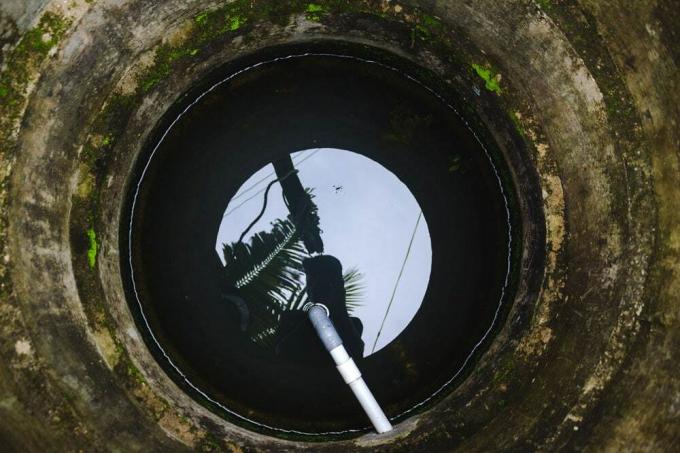
table of contents
- root cause
- Addition of oxygen
- Iron filter
- Rinse
- frequently asked Questions
Ferrous well water is a problem that is immediately noticeable. The water looks cloudy, tastes unpleasant and can damage components such as the pump in the long run. You can find suitable solutions here.
In a nutshell
- Ferrous well water is mainly caused by the corrosion of iron pipes
- iron deposits and washouts occur
- Oxygen supply and the use of filters counteract the deposits
root cause
Before you can use any particular method as a solution, you must first know the cause of the iron-containing well water. This shows why the artificially created water sources are often mixed with the metal. The following causes are to be mentioned:
- extracted from the soil
- Corrosion of iron pipes

In most cases, it is corrosion that causes the iron to get into the service water. This process is completely natural and can only be prevented by regular checks and changing the pipes. If the process water contains iron, deposits occur, which in turn lead to clogging, i.e. the iron being washed out. You will learn what you can do about it in the next sections. It is important that you do something about the iron, as the deposits significantly reduce the performance of the system and increase wear and tear. In the long run, this can result in higher costs.
Note: Zinc coated pipes are not protected against corrosion. So don't be surprised if the water in your well contains iron.
Addition of oxygen
In order to clean industrial water that contains iron, the addition of oxygen is recommended. There is dissolved iron (II) in the process water, which takes care of the deposits when it oxidizes. Since in most cases this happens outside of the well, there are signs such as the unpleasant taste. If you enrich the well water with air beforehand, the iron (II) products oxidize to iron hydroxide, which flocculates in the water. This is where the most important point comes into play: The filtering. The oxygen is used in front of the filter so that the iron flakes can be collected by the filter system after the oxidation. Although you have to clean the filter system more often with this variant, you do not have to be satisfied with the rust water.

Tip: Sand filters are well suited to remove iron (III) from industrial water. Over time, you only have to apply a backwash, after which it can be used again without any problems.
Iron filter
Iron filters are recommended for every well whose water contains iron. Iron filters are installed between the pump and the hose and filter the iron from the process water using cartridges. This process works automatically after the filter is connected, as the movement of the water carries the deposits into the cartridges. Iron filters have several advantages:
- favorable acquisition costs
- quick installation
- immediate effect
- compatible with various connections
- Duration of action: 90 to 180 days
When choosing an iron filter, you must pay attention to the specified values. These include, for example, the recommended working temperature or the optimal flow rate at which the device can work effectively.
Note: Professional de-ironing systems use a combination of filters and a constant supply of air to treat the process water. For this reason, they are correspondingly more expensive than conventional iron filters.
Rinse

In rare cases, it will be enough to thoroughly rinse the pipes of the well. In this way, possible deposits are removed from the water cycle and fresh food is available to you. This variant can be used if the well water has not been used for more than 72 hours. Since it stagnates during this period, larger amounts of iron can be flushed out of the service water. In combination with the methods already mentioned, rinsing is even more effective.
frequently asked Questions
No, if the water from the well contains iron, it does not pose a threat to your health. In addition to the characteristically unpleasant aroma, it is possible for bacteria to accumulate on the deposits. For this reason, it is advisable to clean the contaminated well water before using it and to do something about the iron build-up. In this way, the enjoyment of the water is safe for you and your family.
In most cases the concentration of iron is too low to damage plants in the long term. However, there are some plants, especially mosses, that cannot tolerate too much iron. It is essential to avoid oversaturation with these. Most of the classic Garden plants and exotic species have no problem with iron.
If the water has not yet been de-ironed, the substance can discolour surfaces in the garden and house, laundry and floors. If you use it to wash your clothes, for example, they may turn reddish in color. These are so-called rust spots, which are clearly recognizable by their color and shape. They can be removed with appropriate home remedies.
Regular water analyzes make prevention much easier. You always have the iron values in view through an analysis and can act accordingly quickly if the process water becomes too ferrous. Therefore, do not miss the use of the analyzes.



